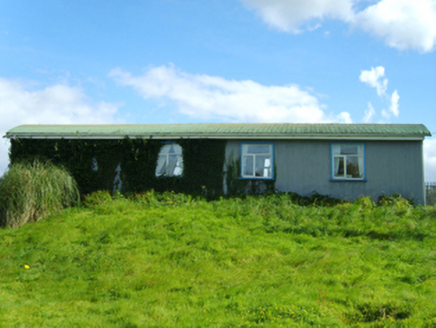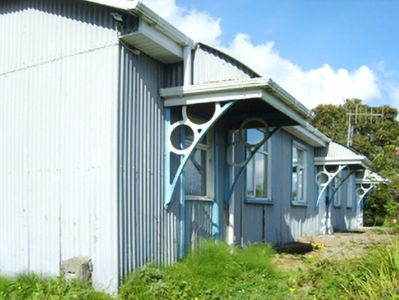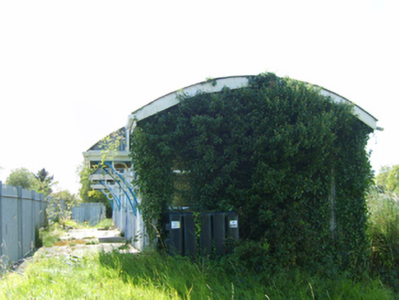Survey Data
Reg No
15700322
Rating
Regional
Categories of Special Interest
Architectural, Historical, Social, Technical
Original Use
Railway station
In Use As
House
Date
1885 - 1890
Coordinates
320089, 167517
Date Recorded
26/09/2007
Date Updated
--/--/--
Description
Detached seven-bay single-storey barrel-roofed railway station, opened 1887, on a rectangular plan; four-bay single-storey rear (west) elevation. Burnt, 1923. Closed, 1963. Renovated, ----, to accommodate occasional alternative use. For sale, 2005. Corrugated-iron-covered segmental barrel roof on an E-shaped plan extending into canopies on roundel-detailed cast-iron spandrels with replacement uPVC rainwater goods on boxed eaves. Corrugated-iron-covered walls. Square-headed central door opening with timber surround framing replacement glazed uPVC panelled door. Square-headed flanking window openings with timber sills, and timber surrounds framing replacement uPVC casement windows. Remodelled square-headed door openings (end bays) with timber surrounds framing replacement uPVC casement windows. Set in shared grounds.
Appraisal
A railway station identified as an integral component of the later nineteenth-century built heritage of north County Wexford on account of the connections with the continued development or "improvement" of the Dublin, Wicklow and Wexford Railway (DWWR) line by the Dublin, Wicklow and Wexford Railway (DWWR) Company with the architectural value of the composition, one recalling the contemporary Palace East Junction Railway Station (1887), Rathurtin (see 15703006), suggested by such attributes as the symmetrical footprint centred on a canopied doorcase; the expeditious corrugated-iron surface finish (cf. 15704046); and the curvilinear roof. Having been well maintained, the form and massing survive intact together with quantities of the original fabric, thus upholding the character or integrity of a railway station forming part of a self-contained group alongside an adjacent railway station master's house (see 15700323) with the resulting ensemble making a pleasing visual statement in a rural street scene.





